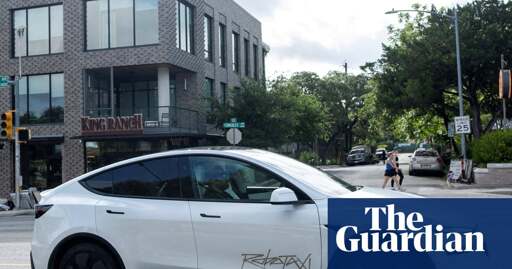- cross-posted to:
- [email protected]
- cross-posted to:
- [email protected]
After years of promising investors that millions of Tesla robotaxis would soon fill the streets, Elon Musk debuted his driverless car service in a limited public rollout in Austin, Texas. It did not go smoothly.
The 22 June launch initially appeared successful enough, with a flood of videos from pro-Tesla social media influencers praising the service and sharing footage of their rides. Musk celebrated it as a triumph, and the following day, Tesla’s stock rose nearly 10%.
What quickly became apparent, however, was that the same influencer videos Musk promoted also depicted the self-driving cars appearing to break traffic laws or struggle to properly function. By Tuesday, the National Highway Traffic Safety Administration (NHTSA) had opened an investigation into the service and requested information from Tesla on the incidents.
Let me tell you how thrilled we all are to have a new hazard added to Austin streets.



Our eyes are not perfect organs so why pretend like they are? Our eyes fail us:
Why wouldn’t we want more incoming data to account for these shortcomings? Optical-only vision-based solutions are incomplete because our eyes are incomplete. I can’t see that a car is stopped dead in the road 10 feet ahead of me in thick fog, but an advanced set of telemetry sensors can. My eyes are not better than the scores of technology we’ve built over the past few decades and I’ve been practicing with them for 46 years. Give me a helmet that includes LIDAR and infrared and night vision and sonar and telemetry from a satellite and GPS and weather tracking and god knows what else and I’ll be much less likely to rear end that car in the fog. We humans invent technology to make up for our shortcomings, so why go with the idea of “if it’s good enough for biological evolution it’s good enough for these multi-ton contraptions we have hurtling down highways next to each other several metres apart at 100 km per hour every second of every day?” It sounds ludicrous on its face. We can choke on a peanut because our swallow tube is the next to the breathing tube ffs. We can do better.
Yeah, the “appeal to nature” fallacy that Musk is using is really dangerous. I want the best tools that are practical for the job, since this has actual life and death consequences. A mix of sensors that work together and covers each others limitations.
People built houses before hammers were invented. But that’s sort of the point of tools: that they can do things more efficiently than we can.